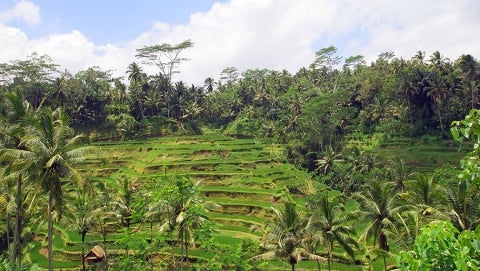Note: Yale School of the Environment (YSE) was formerly known as the Yale School of Forestry & Environmental Studies (F&ES). News articles and events posted prior to July 1, 2020 refer to the School's name at that time.
 A rice terrace in Bali, Indonesia.
A rice terrace in Bali, Indonesia.
The challenge of simultaneously harvesting tropical forest resources and protecting ecosystem health has captured the attention of development practitioners for decades. With the adoption of the United Nations Sustainable Development Goals in September of 2015, “sustainable development” as a formal end-goal has entered the international arena in full force.
Nevertheless, translating high-level “goals” into actionable improvements on the ground is a challenge for policy-makers, scientists, and practitioners alike.
A new special issue of Yale’s Journal of Sustainable Forestry presents timely research on the importance of tropical forests for advancing socioeconomic and environmental sustainability through the lens of the United Nations Sustainable Development Goals.
View the special issue
As the successor to the United Nations Millennium Development Goals, the Sustainable Development Goals detail 17 key efforts — ranging across topics such as poverty, social equality, and climate change — that will guide sustainable development from the period of 2015-2030.
While the Sustainable Development Goals are broad, explicit mention of the role that tropical forests can play is found to be extremely limited in the actionable “targets” of each goal. In reviewing the academic literature, the lead article of the special issue finds that focusing efforts on economic, social, and environmental sustainability within tropical forested regions will achieve progress towards all 17 of the Sustainable Development Goals.
Furthermore, given that tropical forest biodiversity and resource provisioning are significant at a global level, the scale of benefits achieved from improving environmental management in tropical forests extends beyond that of the immediate community.
“The diversity of topics covered in this issue really speaks to the complexity of achieving sustainable development while conserving tropical forests,” said Jacob Bukoski ’16 M.E.Sc., one of the guest editors of the special issue.
Other highlights from the special issue include:
The Journal of Sustainable Forestry is a peer-reviewed international scientific journal published by Taylor and Francis.
Bukoski, Erika Drazen ’17 M.E.Sc./M.B.A., Whitney Johnson ’16 M.E.M., and Latha Swamy ’16 M.E.M. served as guest editors. The special issue serves as the formal conference proceedings from the Yale Chapter of the International Society of Tropical Foresters’ annual conference in 2016.
The Yale International Society of Tropical Foresters will be holding its 24th annual conference at the Yale School of Forestry & Environmental Studies from Feb. 1 to 3. For more information on the conference see here.
Nevertheless, translating high-level “goals” into actionable improvements on the ground is a challenge for policy-makers, scientists, and practitioners alike.
A new special issue of Yale’s Journal of Sustainable Forestry presents timely research on the importance of tropical forests for advancing socioeconomic and environmental sustainability through the lens of the United Nations Sustainable Development Goals.
View the special issue
As the successor to the United Nations Millennium Development Goals, the Sustainable Development Goals detail 17 key efforts — ranging across topics such as poverty, social equality, and climate change — that will guide sustainable development from the period of 2015-2030.
While the Sustainable Development Goals are broad, explicit mention of the role that tropical forests can play is found to be extremely limited in the actionable “targets” of each goal. In reviewing the academic literature, the lead article of the special issue finds that focusing efforts on economic, social, and environmental sustainability within tropical forested regions will achieve progress towards all 17 of the Sustainable Development Goals.
Furthermore, given that tropical forest biodiversity and resource provisioning are significant at a global level, the scale of benefits achieved from improving environmental management in tropical forests extends beyond that of the immediate community.
“The diversity of topics covered in this issue really speaks to the complexity of achieving sustainable development while conserving tropical forests,” said Jacob Bukoski ’16 M.E.Sc., one of the guest editors of the special issue.
Other highlights from the special issue include:
- An international assessment of drivers of illegal logging in Indonesia
- Lessons learned for capacity building in tropical forest management organizations
- A discussion of potential shortcomings in carbon offset programs
- Investigation of forest resource use and dependency by indigenous populations in Cambodia
- An analysis of competing interests between forest conservation and harvesting of bioenergy crops
The Journal of Sustainable Forestry is a peer-reviewed international scientific journal published by Taylor and Francis.
Bukoski, Erika Drazen ’17 M.E.Sc./M.B.A., Whitney Johnson ’16 M.E.M., and Latha Swamy ’16 M.E.M. served as guest editors. The special issue serves as the formal conference proceedings from the Yale Chapter of the International Society of Tropical Foresters’ annual conference in 2016.
The Yale International Society of Tropical Foresters will be holding its 24th annual conference at the Yale School of Forestry & Environmental Studies from Feb. 1 to 3. For more information on the conference see here.
Published
January 23, 2018